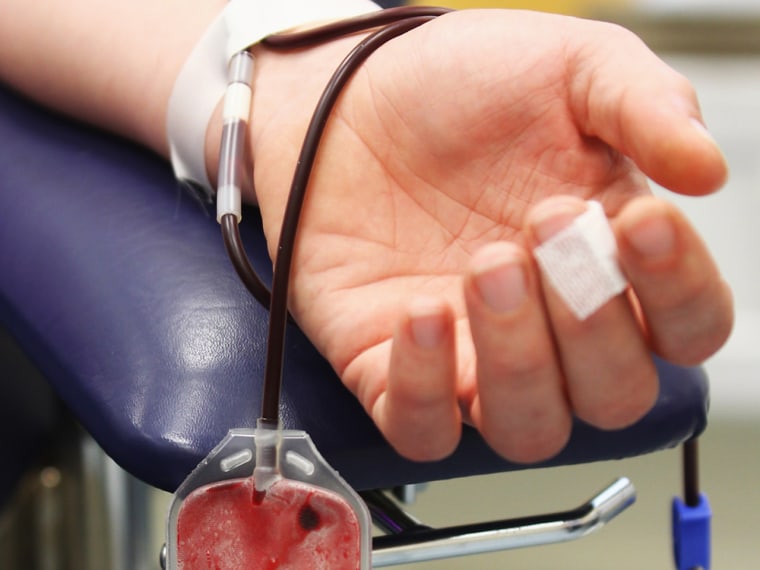The United States is facing a health care crisis.
Our supply of blood is dangerously low. The American Red Cross reports that across the nation blood donations were down an estimated 10 percent in June -- about 50,000 fewer donations than in May.
In the face of a blood supply shortage that is bad and likely to get worse, there is a group of people -- gay men -- who might ease the situation, if only they were allowed to help.
Gay men who want to donate blood are forbidden because of an outdated, non-scientific regulation that bans anyone who has had sex “even once” with another man since 1977.
It is long past time to let those who want to help others by donating blood do so.
Our blood supply depends on a tiny handful of heroic repeat donors. But, making things worse, there is emerging concern about the danger of donating blood too often. Donations are down from last year -- and last year was a very bad year in terms of the availability of blood. The Red Cross, which a major collector of donated blood in the U.S. has issued an emergency call for blood of all types and donations of platelets, key-clotting components of blood that are often needed by cancer patients.
One reason for the critically low supply is seasonal. People don't donate as much during summer vacation. Another reason is school closings—a good amount of donated blood comes from high schools and colleges that are not open in the summer.
But, another reason, one that is getting worse year after year, is too few donors. Only about 5 percent of eligible Americans donate blood. Of that number many donors, as high as 70 percent, come from a much smaller number of repeat donors. And that group is shrinking, since older donors -- the members of the World War II and Korean generations -- give at higher rates than younger individuals.
There is growing concern that giving very often can lead to iron deficiency. That can lead to fatigue, compromised mental function and eventually anemia. A major study has been launched to find out how often a person can safely donate each year. Depending on the study’s findings, there may be tighter restrictions on the number of times a person can donate in a year. That could mean even more trouble for the blood supply.
Which leads us back to gay men. The ban on donation by men who have sex with other men dates from the height of the AIDS epidemic in the early 1980s, when there was not even a name for the disease. At that time there were no tests to find the HIV virus in the blood supply. Many people, especially hemophiliacs who rely on regular transfusions, died from HIV they got from donated blood.
Much improved HIV testing has made the old rule obsolete. The Food and Drug Administration acknowledges that HIV tests are highly accurate, with the risk from a unit of blood reduced to about 1 per 2 million units in the U.S. The worry is from the risk during the “window period” which occurs very early after being infected with HIV when even current testing methods can’t detect antibodies. But the Red Cross, America’s Blood Centers and the AABB, a blood donation advocacy group, all support throwing out the ban. So does the American Medical Association, which just voted on June 20th to ditch the ban. All these groups seek a rule that targets risky sexual behavior that could compromise the blood supply that might not be picked up by today's highly accurate testing.
In essence, this means a waiting period of months -- not decades -- for any would-be donor who has had risky, unprotected sex, be it male-to-male or unprotected heterosexual sex with multiple partners or prostitutes. Canada, Britain, Australia, Japan and New Zealand have all moved to adopt this more reasonable and scientifically sound policy.
Dying for want of blood should not happen in America. Each of us who is able ought to donate. There are no easy estimates how many gay men would donate, or how much, or how often. But a national blood drive on July 12 urged healthy gay or bisexual men to attempt to donate blood at local centers, as a protest against the FDA ban saw a large turnout.
With the supply as poor as it is, the argument for excluding people based on a rule that is based on nothing but fear makes no sense.
Arthur Caplan is the head of the Division of Medical Ethics at NYU Langone Medical Center.
